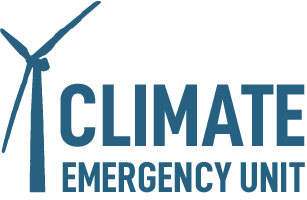ABOUT THE 6 MARKERS OF CLIMATE EMERGENCY
How do we know when a government is in emergency mode?
When they act like it.
Adopted from Seth Klein’s book, A Good War: Mobilizing Canada for the Climate Emergency, we’ve developed a framework to determine whether governments or large institutions are in genuine emergency mode.
About the 6 Markers of Climate Emergency
We believe that it’s not too late to change the course of the climate emergency and prevent more catastrophic suffering. But to do this, we need the kind of transformational change not seen since the Second World War.
We got a glimpse into emergency mode during the first year of the COVID-19 pandemic, but the government failed to sufficiently hit Marker 5 (leave no one behind.)
As explained in Seth’s book, the Canadian government took extraordinary measures during the Second World War to ensure that it successfully navigated and confronted the rise of fascism. During the war, the government hit Markers 1 through 4 big time, and partially hit Marker 5.
These war-time measures worked once, and can be used again to fight the most dangerous threat we have ever faced: the climate crisis. But, it can’t be overstated how important it is to expand on the war-time measures of WWII to empower historically excluded populations of today and nurture a more just society for our future generations.
When asking people to enlist in a grand societal undertaking, we have to make a commitment to them that the society that will emerge from the other end of that effort will be more just and fair than the one they are leaving behind.
6 Markers of the Climate Emergency
-

Spend what it takes to win.
Is the government willing and ready to budget and spend what’s necessary?
LEARN MORE:
Watch: “There’s always money for the military. But climate?”
-

Create new institutions to get the job done.
To reduce carbon emissions, we need new infrastructure like renewable energy solutions, efficient and accessible transportation, and zero carbon buildings. We need new public corporations and federal programs that will mass produce and deploy the items needed to decarbonize and electrify our society.
LEARN MORE:
Watch: “Why Canada's response to Trump's threats requires imagination and audacity”
Read: “If Carney wants to build, he should go big on a Youth Climate Corps”
-

Shift from voluntary & incentive-based policies to mandatory measures.
We cannot beat the climate emergency with incrementalism and we cannot incentivize our way to victory. Will the government implement policies that require Big Oil and other major greenhouse gas emitters to reduce their emissions? Will they set clear and strong regulations that ban fossil fuels from our buildings and vehicles on a timeline that aligns with the emergency?
LEARN MORE:
Read: “Like we did for tobacco, we must ban false fossil fuel ads”
Read: “Mobilization works! Vancouver votes to maintain its prohibition on gas heating in new homes”
Watch: “Vancouver City Council & the fight to prohibit natural gas: A win for climate action!”
-

Tell the truth about the severity of the crisis & communicate urgency.
We’ve heard the honest pleas from climate scientists in the latest IPCC report, and now we must hold our government to the same standard. Is the government ready to communicate to Canadians that we face an emergency? Will their messaging be coherent and consistent? And is the government ready to say a clear ‘no’ to the new fossil fuel extraction and infrastructure projects that the International Energy Agency and the IPCC have now said unequivocally we no longer abide?
LEARN MORE:
Read: “Crisis, what crisis? We need a climate emergency information agency”
Watch: “CBC must strengthen its case on climate for our (and its own) survival”
-

Leave no one behind.
A society-wide mobilization requires social solidarity, and inequality is toxic to social solidarity. The government needs to make a hopeful and compelling offer to people, particularly those who feel their economic and employment security is tied to fossil fuels. In implementing major transformations, how will the government ensure that all people receive fair and equitable treatment and opportunities? What supports will be in place for lower-income households as we undertake this transition? What Just Transition support will be in place for fossil fuel workers and Indigenous communities on the front-lines of fossil fuel extraction? And will Big Oil and the wealthy be made to pay their fair share?
LEARN MORE:
Watch: “Just Transition Transfer could be linked to funding climate infrastructure projects”
-

Indigenous rights & leadership are essential to winning.
How does the government plan to uplift, empower, and uphold Indigenous sovereignty and rights? This includes land rights and title, specifically, the right to deny pipeline expansion and industry land grabs. How will the government honour the articles in the United Nations Declaration on the Rights of Indigenous Peoples (UNDRIP), and ensure those rights are upheld in the face of fossil fuel projects? And how will the federal government support the efforts of Indigenous communities to gain energy and food independence, free of fossil fuels?
LEARN MORE:
Read: “The next big LNG proposal - Ksi Lisims - may be the sleeper climate issue of 2024”
Watch: “Indigenous Youth & The Green Jobs Revolution” (webinar)
How to use the framework
We encourage you to employ this framework with the institutions and groups that you are a part of. Whether you are in a student organization, a union, a faith group, etc, the emergency markers framework can be used to ensure your organization is acting in genuine emergency mode.
The sky's the limit! We need all hands on deck to meet the needs of the climate emergency.

